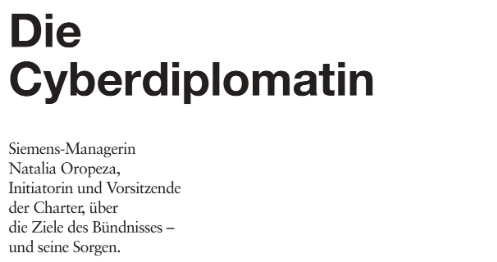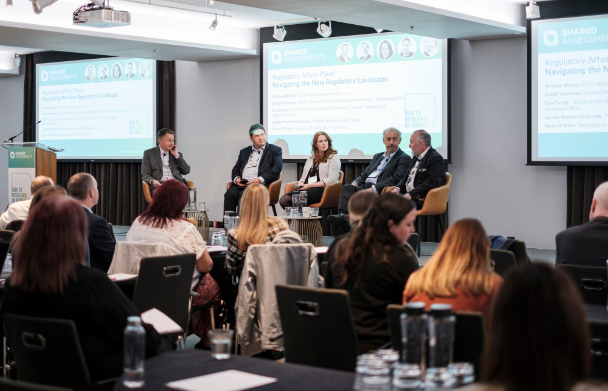No private company can face the monumental cybersecurity challenge alone. Now is the time for the public and private sectors to step up their collective efforts to improve nations’ cybersecurity for decades to come. The Charter of Trust is one of the key platforms to achieve this.
by Jonathan Sage, Cybersecurity Policy Europe, IBM
As our dependency on technology continues to grow so will the scale and sophistication of cybersecurity threats. For businesses, the intensification of cybercrime can be explained by Sutton’s law: that’s where the money is. The cost of cybercrime – already in the billions of dollars – rises each year and continues to increase in frequency, scope, and severity of impact.
While some attacks are costly and inconvenient, others can be crippling. With cybersecurity quickly becoming a new battleground for state competition, businesses and government share a collective responsibility to collaborate on preventing cyberattacks that could have a devastating impact or prompt national or global crises. We must join forces now to shore up the security of the critical infrastructure that keeps our society functioning.
As a leading enterprise security firm, IBM is uniquely positioned to help. Our teams use cloud and AI-powered software to manage 150 billion cybersecurity events each day for more than 17,000 commercial and government clients worldwide. Drawing on this breadth of expertise and capabilities, IBM is ready to do its part to help build enduring cybersecurity.
In a recent meeting with U.S. President Biden and members of his Cabinet, IBM’s Chief Executive, Arvind Krishna had in-depth discussions on how America’s digital defenses can be strengthened, making five key commitments that IBM is pledging to help address this imperative, which align well with IBM’s engagement as a founding member of the Charter of Trust:
1. Building a more robust and diverse cyber workforce
With nearly 500,000 unfilled cybersecurity jobs across the U.S. (Source: NIST), IBM is going to help prepare more American students and workers for those vital roles by training more than 150,000 people in cybersecurity skills over the next three years through a range of programs, such as SkillsBuild. Workforce issues, training and diversity are key elements in the Charter of Trust’s Principle 6, “Education”. We also will partner with more than 20 Historically Black Colleges & Universities to establish Cybersecurity Leadership Centers to build a more diverse U.S. cyber workforce.
2. Measuring progress and results
We need to go beyond cybersecurity commitments and focus on measuring tangible progress and results. Measurement tools already exists in Environmental, Social, and Governance (ESG) reporting. In line with Principle 1 of the Charter of Trust, “Ownership for cyber and IT security”, IBM is calling for the establishment of voluntary public reporting standards on cybersecurity practices. We believe the cyber framework developed by the National Institutes of Standards and Technology (NIST) could serve as a strong starting point for building such a reporting system.
3. Protecting critical infrastructure
Dealing with a cybersecurity crisis is a matter of when, not if. To help critical infrastructure organizations better prepare for and recover from ransomware attacks, we are announcing IBM Safeguarded Copy—a new data storage solution that can shorten the time it takes for organizations to recover from days to hours. IBM is already working with industries that operate critical infrastructure and will expand this offering to other clients.
4. Accelerating quantum-safe cryptography
While quantum computers will help solve new categories of problems that are beyond the reach of even today’s most powerful traditional computers, they will also make our current encryption methods obsolete. As we prepare for a quantum world, IBM is committed to developing and deploying new, quantum-safe encryption methods such as lattice-based cryptography.
5. Securing the Technology Supply Chain
Finally, IBM participates in an effort led by the National Institute of Standards and Technology (NIST) to develop a comprehensive framework to improve the security of the technology supply chain, reflecting the goal in Principle 2 of the Charter of Trust, “Responsibility throughout the digital supply chain”. This work builds on IBM’s engagement with NIST on software supply chain security following the U.S. President’s recent cybersecurity executive order, and it also will include a focus on open-source technology in which IBM has decades of expertise.
Protecting the digital economy: A concerted effort
As we have seen in just the past few months, cyberattacks can cause widescale disruption, economic upheaval, and even physical damage. If nothing is done, future attacks could become even more destructive and impact the power, transport, and communications systems we all depend upon to live and work.
IBM is already taking action on many fronts to protect the digital economy – from keeping our data secure, to helping cyber-defenders become as collaborative as cybercriminals, to inspiring a new generation to pursue careers in cyber, and more.
That said, no private company can face this monumental challenge alone. Now is the time for the public and private sectors to step up their collective efforts to improve nations’ cybersecurity for decades to come. The Charter of Trust is one of the key platforms to achieve this.


You may also like

Chairwoman Natalia Oropeza in Brandeins Magazine
In an interview with Dorit Kowitz, Natalia dives deep into the pressing issues facing the cybersecurity landscape, explaining how the Charter of Trust bundles the expertise of different businesses across several regions to stay resilient in the face of evolving threats. As Natalia Oropeza says: "We all win if cybercrime doesn’t win."
Here are three key insights from her interview:
🔑 Collaboration is essential: No single organization can tackle cyber threats alone. The Charter of Trust is a prime example that businesses nowadays are more transparent when it comes to attacks and that sharing information in this field can be beneficial.
🔑 Addressing the digital skills gap: The Charter of Trust is working to address the global shortage of cybersecurity professionals by encouraging diversity and actively promoting opportunities for women to join the field.
🔑 Unified regulations: Harmonizing global cybersecurity standards will reduce vulnerabilities, helping businesses and governments combat threats more effectively.
The full interview is available here: https://lnkd.in/gRm6ZDGC


Cybersecurity Awareness Month
The complexity and urgency of this topic gathered a lot of interest, with 600+ attendees throughout the whole panel, which was composed of Jon-Paul Jones, COO at AZ Commercial, Firas Ben Hassan, GenAI expert & Manager of AllianzGPT at AZ Technology, Dr. Martin J. Krämer, External Security Awareness Advocate at KnowBe4, and Dr Sumit Chanda, Global CISO at Eviden & Chair of the Global External Engagement Working Group at the Charter of Trust.
We are pleased to see Dr. Sumit Chanda from Eviden bringing in his unique CISO insight on what these emerging technologies mean in day-to-day cybersecurity practices and bringing in the Charter of Trust perspective on this topic as well.
Thank you, Ervin Cihan and Haydn Griffiths for inviting other CoT Partners and for the great initiatives that Allianz is putting together within this year’s Security Awareness Month. And special thanks to Heather Armond for the great moderation.


UK/EU Summit - “Risk to Resilience”
💡Under the theme “Risk to Resilience” the first event of this series was held in London and brought together professionals from different industries and regions. Detlef participated in the panel about the complex regulatory landscape and emphasized that new legislation like the EU AI Act, DORA and Hashtag#NIS2 continue to push the standard of care on cybersecurity and other risks.
Thanks to Shared Assessments for organizing such an amazing event and inviting the Charter of Trust to participate in this high-class panel alongside Andrew Moyad, CEO at Shared Assessments.



